Approval Of Draft Domestic Worker Protection And Welfare Policy 2010
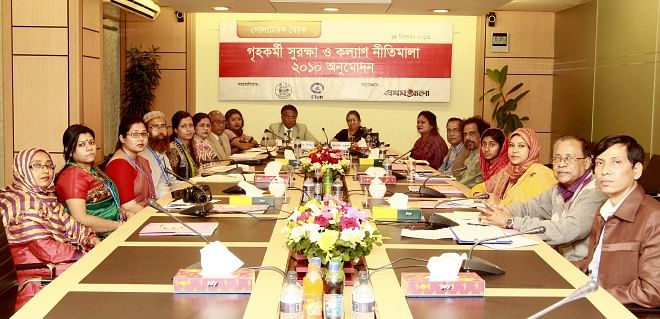
Prothom Alo in association with Nari Maitree and Plan International Bangladesh organised a Roundtable on "Approval of Draft Domestic Worker Protection and Welfare Policy 2010" on December 14, 2013. We publish a summary of the discussion.
-Editor
Abdul Qaiuum, Associate Editor, Prothom Alo
According to a study of Unicef and ILO, there are more than 0.4 million domestic workers in Bangladesh. Today it has increased manifold and among them around 0.15 million works are employed in different households in Dhaka city.
Often poor parents cannot afford the cost of bringing up their children. So they send them to work in houses thinking that their children will be well fed and have a good life there. But the reality is different. Child domestic workers face physical, mental and sexual harassment. They have to work for 14-15 hours a day. Often we come across news of brutal torture on domestic workers by the employers. There is a regulation on not to employ children below 12. We should rethink over this age limit.
We have to be humane about it. There are different rules and regulations on protection and welfare of domestic workers. There is also a High Court directive in this regard. We have to work for effective implementation of these regulations. We should also change our outlook towards domestic workers.
Mikail Shipar, Secretary, Ministry of Labor and Employment
We have draft Domestic Worker Protection and Welfare Policy 2010. It was prepared by civil society members. We are trying our best to adopt the policy. Since the Labor Ministry has been occupied with problems in garment industry, they got little time to focus on other issues. We have planned to enact security policy for protection of domestic workers. We have taken various steps to reduce the number of domestic workers. We are trying to bring them under social protection network. We need to prepare a clear outline for these activities.
Our social protection programmes should be strengthened. We have to make people aware about rights of domestic workers so that no one has to suffer like Aduri.

Salma Ali, Executive Director, Bangladesh National Women Lawyers' Association
Young girls are particularly victims as domestic workers. In both local and international standards, this is a severe violation. We do not obey our constitutional principles on child labour. It is really very regretful. Still we do not have any law against sexual harassment in workplace. We are working hard to pass this law.
From our organization we have been registering child migration. This is done by collecting information from their parents. It will help protect them and put restrain on internal trafficking. Child traffic is very common in our country. We have prepared a draft law on this but it is yet to see light.
As a lawyer, it is my observation that violence persists in our country because criminals escape through different loopholes of our existing legal system. Most of the cases remain unresolved. In the first phase, these cases do not come out? When victims face unbearable situation, only then they contact with us. Unfortunately some cases are dropped due to false lawsuit and false witness.
We have no agreement on labor migration with those labor receiving countries. Countries like Sri Lanka has inked agreement on the work place safety, time schedule, wage and other labor rights issues with the receiving countries. Such agreements provide legal support to labourers in the foreign land. Our government should take immediate action to initiate such agreements.
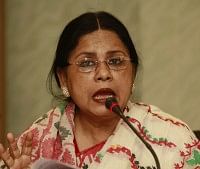
Shaheen Akter Dolly, Executive Director, Nari Maitree
We do not know the exact figure of domestic workers. There is a general estimate that there are about two million domestic workers in our country. Had there been a registration system we would have got the real figure. We have to emphasize on registration of child domestic workers.
We have to change our mindset. We have to coordinate field experiences of government and NGOs. We have to strengthen the monitoring cell and then many issues will be unearthed.
Proper implementation of policy is very important. It is not a big deal whether the policy is finalized or not. Perpetrators should be given exemplary punishment. Everyone should behave in proper way with domestic workers.
We have to be cautious that no one can violate the condition of not employing children below 14 years. We have been working with a small portion of 2 million domestic workers. We have found that a large number of them are below 12.
Many NGOs work with child domestic workers. They have vast field level experience. We should share these experiences and learn from each other.
Finally, we urge the government to take prompt action to finalize Domestic Worker Protection and Welfare Policy 2010.

Lutfun Nahar, Project Coordinator, Nari Maitree
The number of child domestic workers in Bangladesh is around 0.45 million. Existing patriarchy, economic vulnerability, social insecurity and ignorance of families are serious impediments to expected mental and physical development of our children. They are growing up in a cheerless society amidst violence, discrimination and torture.
In our society, many families consider girl children as burden. So they want to get rid of the burden by sending them (girl children) for domestic work or marrying them off. In consequence those girl children suffer from physical, mental, economic discrimination and violence. They grow up as uneducated, weak and undernourished individuals.
A child domestic worker has to do many risky jobs that are not permissible in such tender age. As there is no fixed work hour s/he has to work continually from early in the morning to late at night. So she misses opportunities of education, entertainment, timely healthy diet, rest, even information about physical and mental changes at the adolescent age.
If we adopt and effectively implement Domestic Workers Protection and Welfare Policy 2010 we would, at least, be able to prevent employment of children below 14 in domestic works. It is enumerated in Article 6 of Convention on the Rights of the Child that “State Parties shall ensure to the maximum extent possible the survival and development of the child”. It is also our constitutional obligation to meet fundamental and human needs of children. The more we delay in realizing this pledge, the more our state will suffer.

Seema Akhter, Domestic Worker
I came to Dhaka in 2007 and started working in my employer's house. One day Nari Maitree's community mobiliser went to that house and provided information about protection and rights of a domestic worker. I did not have any prior knowledge about these rights. Being aware about these, my employer started sending me to a learning center run under Child Domestic Worker Project. Now I am continuing my education in a child friendly environment. It has changed my life. Nari Maitree provided me with birth registration certificate and life skill training also.
I wish every child domestic worker will get this opportunity. They should get proper wages, entertainment, leisure to take rest, time to read and all the facilities that a child needs. I would request the government to give recognition and dignity to our work. We do not want to be called a domestic worker.
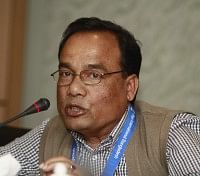
Abdul Mannan, Programme Unit Manager, Dhaka Programme Unit, Plan International Bangladesh
According to National Child Labor Survey, there are 1,25,000 children engaged in domestic works. And the number is increasing day by day. Plan International Bangladesh has been actively working on child domestic work which is very inhuman. From the work experience it can be said that bringing children out from domestic works and reintegrating them into society are really difficult. There are many other reasons than poverty that leads children to domestic work. We have to address those issues also. We have to start from root level.
To identify the real number of child domestic workers we should start by registration of child domestic workers.
In our project we have found 185 out of 400 child domestic workers are below 12 years which is pathetic. According to our national standard, up to 18 years a human is considered a child. However, a child cannot be employed in works. At the same time we are saying that children aged 14 years and above can be employed in domestic works. I think this is contradictory. Only in special cases the age limit can be considered where the child will get proper facilities of mental and physical development.
An important integration step can be giving skill training to child domestic workers. In our project we have tried to provide some vocational training to them. Most of them do it as a part time work. They get three to six months training. They are doing really well. But they are above the general age limit of child domestic workers. It is difficult to bring the large number of child domestic workers to this type of reintegration programs. That's why we need government support.
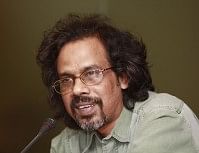
Sharfuddin Khan, Child Protection Unit, Save the Children
I have worked with ILO on this issue for 10 years. It is easy to say about rights of domestic workers but difficult to implement. Only 1% of them are fortunate like Seema and rest 99% are victims of torture and discrimination. On one hand, families send their children to work to off load burden and on the other, employers of domestic workers employ them to do household works which they do not want to do. This is a tradition. So to break it is a difficult task.
Recently government published a list of hazardous work for a child taking into account overall work condition in our country. This list was prepared in accordance with ILO Convention 182. According to this list, an under 14 child cannot be employed in any domestic work. In special cases children aged 12 and above can work in sectors which are not hazardous to their physical and mental development. This list is a product of long time effort by different national and international organizations and obviously having government's commitment. It took almost 10 years to pass this list. In ILO Convention 182, there is a clear definition of hazardous work: work for more than five hours per day, works that create pressure on physical and psychological status, works in insecure and unhealthy environment, work without wage or irregular payment, carrying out duties disproportionate to his or her capacity, works that hinders education, forced labor, works where children become victim of physical or mental torture, no opportunity of leisure or recreation and so on. Can anyone say that domestic work does not fall in the category of hazardous work? They do work for more than 10 hours; they do risky jobs like carrying hot water for bathing. We exploit their cheap labor. I do not understand why domestic work is not included in hazardous works list. How many rules and regulation are needed to solve this curse?
This cannot be solved overnight. We have to take meaningful steps to gradually wipe out child domestic works. We have to ensure birth registration, wages, work place safety, gentle behaviour like steps that can at least protect them from violence and abuse. It is not true that all parents send their children for food. Some fall into trap of dalals who lure them giving wrong information. The government and society should work together to eliminate this dangerous threat to our future generation.

Morium Nesa, Acting Programme Coordinator, Protection of Vulnerable Children, Plan International Bangladesh
In our Child Domestic Worker Project we work with a few children. We do not have adequate resources to cover such a large number of child domestic workers. NGOs cannot do it alone. It can only be realized through government cooperation. Government has to take the lead. We will provide them with all kind of support.
We can only motivate children, their parents and the concerned authorities. Due to lack of any law or government mechanism, we cannot put pressure on employers to oblige rights of child domestic workers. So the whole thing depends on employer's mercy. Government has to take the predominant part in it and we will always be on their side.

Abul Hossain, Director, Multi-sectoral Programme on Preventing Violence Against Women, MOWCA
There are child domestic workers in rural areas also. But there is less discrimination in those places. In urban areas life is more difficult and families do not want to spend enough for domestic workers.
We cannot eradicate child domestic workers only by legislation. We have to take some small but significant steps.
We have to establish contact with child domestic workers. In our country it is often found that after employment in domestic works contact between the children and their parents is being stopped by the employer. We should introduce smart card facilities so that parents as well as government can be in constant touch with the child. Government has already introduced this facility for our migrant workers. From MOWCA we have introduced a help line. The number is 10921. If any occurrence of violation is reported to this number we can take immediate action. Within Dhaka city we can rescue any victim within an hour. This number should also be made widely spread so that child domestic workers, their parents and peer groups can learn about it.
We have to also create awareness among employers. If we inform them about High Court's Direction about child domestic workers they will be aware about rights of child domestic workers. At initial stage it can be said that as you are employing a child labour you should provide them off period so that they can go to school.
We have to identify child domestic workers. In urban areas we can take information of child domestic workers from apartment societies or gatemen of a building as to how many child domestic workers are employed in various flats there. Birth registration will also be helpful in this regard.
Parents should be made aware also. In many cases middle men or dalals recruit children alluring their parents of a bright future of their children. This must be stopped.
Finally, in developed countries people do household chores on their own. We can also do that. We just need to change our mentality. We should discourage employing domestic workers for household chores.
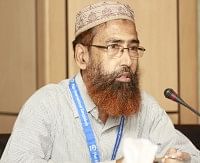
Syed Matlubur Rashid, Adviser, Child rights, Plan International Bangladesh
We should start from our own home. I do not employ any child domestic worker in my house. After some initial difficulties now we are very fine with it. We do our own household chores.
We should engage our media in the awareness campaign. Child domestic workers are generally employed in educated families because they have the financial ability. They have access to TV, newspaper, radio and other media. If media take a proactive role in creating awareness about this issue we will get good results.

Hasina Begum, National Programme Officer, ILO
I want to focus on three challenges. These are global challenges. First, child labourers are statistically invisible. In our Labour Force Survey, we do not get data on child domestic workers. It only shows a general picture of our labor force. The last child labor force survey was done in 2003-04. So we do not have the real picture of our child labourers. Without data it is challenging to do any political or program intervention.
Bangladesh Child Labor Bureau is preparing child labour statistics with the help of ILO Bangladesh. We may get it in April, 2014. It will give us a clear picture of our child domestic workers.
Second challenge is that domestic workers are not included in labour legislations. Only 10 per cent of domestic workers in the world are under legislative laws.
Third challenge is gender equity. Most of the domestic workers are girls. They are more vulnerable to sexual harassment and discrimination. It has intergenerational impacts. Child of a victim mother suffers from physical and mental illness.
Domestic workers are not as available as before. Because, a larger number of girls are engaged in RMG sector. They prefer to work there even for a low salary because they think it has identity and dignity. Labour monitoring is very difficult in our country. The number of labour inspectors is very few. We have to address the problem of inadequate logistic and human resource.
ILO Convention 138 is a very strict and effective regulation. I expect the government to ratify it quickly. ILO adopted another convention on domestic workers which has been ratified by 25 countries.
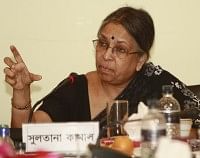
Sultana Kamal, Executive Director, Ain o Salish Kendra
We started to work with the aim of elimination of child labor. We used to give them legal support. Later we realized that only legal support is not adequate. We started doing research on the issue. The title of our first book is 'Where Children are Adults'. The book shows that childhood is missing from child domestic workers' life. They do not get financial support from their families, and that's why we are calling them adult. Nobody takes care of them. They do not get
scope of reading, playing and enjoying life.
We did another research titled 'Children Cry Alone'. Our message was that they are alone in their world. So we have to stand with them. They are confined in houses but out of reach of any legal support.
We have prepared a dropping center model. We prepared a module named 'Amar Prithibi'. It is about self perception of a child. It enables a child to project herself: who am I? What are my rights? What is my duty? It has gained huge popularity at home and abroad. The government has adopted this model in it's ARISE program.
Employing children in domestic work is a problem of our society, culture and economy. We never think of our children in the same position. If a child domestic worker fails to do something we punish them. This is simply brutality. It is a matter of hope that a counter culture is evolving. People are becoming more conscious about child domestic workers' rights.
The significant majority of child domestic workers are girls because they can be employed at a lower wage. They are calm in nature and easier to be controlled. So gender becomes an issue here. We have to address it seriously.
We have prepared a draft Child Domestic Workers Law in 2012 and handed over to the Ministry of Law. Government can consider it as a model.

Mikail Shipar
I fully agree with our discussants that we should have a law on domestic workers' protection and welfare. We would do it as soon as possible. We have to also change our mindset. If we do not change our mindset no law will work.
Recommendations:
- Approval of Draft Domestic Worker Protection and Welfare Policy 2010.
- Changing mindset of employers of domestic workers and other concerned people.
- We all should come forward to protect rights of domestic workers. This is our constitutional obligation.
- Domestic work should be included in the list of hazardous works.
- 2011's High Court directive on protection of domestic workers should be considered as law until a law is adopted in this regard.
- Victim will get support in the earliest possible time if they seek help dialing 10921.
- Domestic workers should be registered.
- Employers of domestic workers and concerned people should be made aware of rights of domestic workers on a regular basis.

 For all latest news, follow The Daily Star's Google News channel.
For all latest news, follow The Daily Star's Google News channel. 



Comments